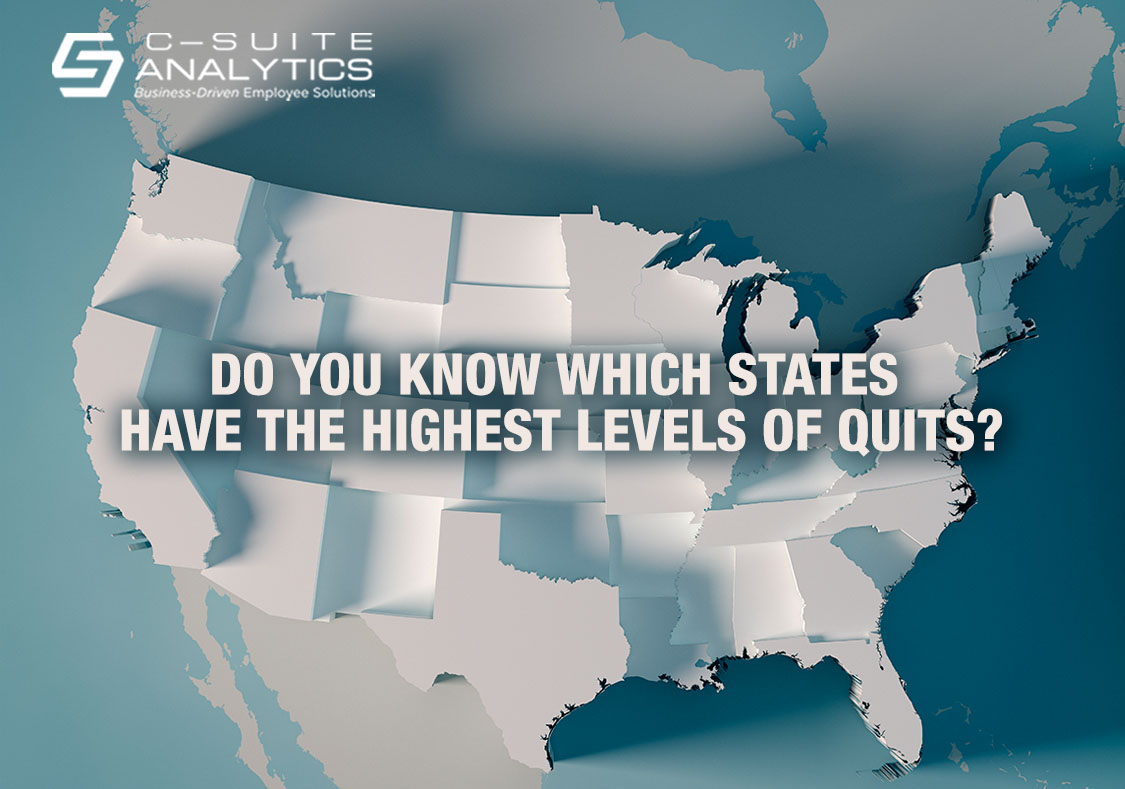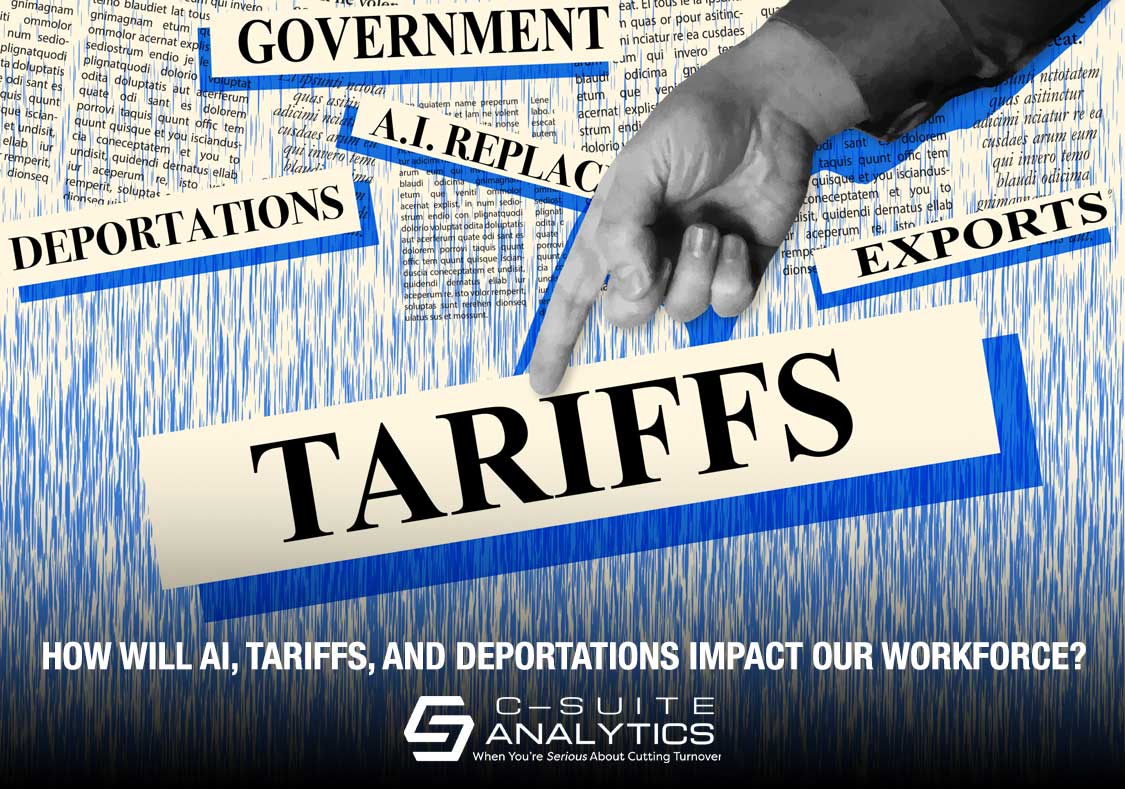AI, deportations, tariffs, and birthrate declines are reshaping America's workforce—blue- and white-collar alike. From baby boomer exits to AI disruptions, breaking down the workforce challenges no leader can afford to ignore.
Which States Have The Highest Levels of Quits?

With much data circulating about “The Great Resignation”, it’s hard to separate which information really matters. Our Bureau of Labor Statistics, or BLS, recently reported quits rate by state…and it matters.
As reported in Business Insider,[i] the precise metric used is the percentage of total workers who quit, and the winner…or loser…is Kentucky, hitting 4.5% in August and exceeding all other states’ readings. Georgia and Idaho followed with rates of 4.2% and 4.1%, respectively. Alaska had the fourth-highest rate of 3.9%.
Which states were lowest? The District of Columbia had the lowest quit rate of 1.7%. Pennsylvania followed with a 2.1% rate. And New York and California, two of the country’s most populous states, had quit rates of 2.2% and 2.5%, respectively. You can see the quit rate for your state by clicking on the first footnote below.
The complete report reveals two Americas, quoting the study’s authors…
“The most densely packed states face a modest labor shortage and elevated quits, but the fallout is minor. In less populated states, however, employers will likely struggle for some time to rehire and retain their staff even as the country broadly recovers.”
We work with client companies all across the US and trust me that every one of those companies would object to a phrase like “modest labor shortage”, regardless of location. Have you noticed long lines at restaurants while sections of tables have been blocked off because of too few servers? So, let’s say ALL of America is struggling to retain workers, while some geographical locations are challenged more than others.
But the point of the analysis is a higher percentage of workers are quitting in non-urban areas. While the first industry that comes to mind might be agriculture, we’ve worked with many manufacturing plants and hospitals located near small towns, too. In fact, manufacturing site planners tend to look for “green fields” where land and the surrounding cost of living is lower. I’m thinking now of one client that has nine plants scattered across the US where some of those plants couldn’t be found on my GPS.
The bigger issue, though, is non-urban locations have fewer workers to choose from. Those aforementioned site planners must also consider the quantity and quality of the local workforce…and the sheer numbers of workers who are available to those plants and hospitals appears to now be reduced.
I just returned from working with a manufacturing plant in rural Colorado, one that is facing high turnover while at the same time planning to add a few hundred jobs for a lucrative expansion, doubling the size of their plant. My first thought when driving toward the plant was “Where are the houses?” Executives reported many employees drive from up to an hour away…and we wondered aloud how many “help wanted” signs they pass each day during their commutes. And while this particular plant has earned a great reputation as a local employer, we’ve seen where quitting employees who complain to their neighbors can turn a total town against a rural workplace.
Last week I wrote about a Wall Street Journal report that 22 of 52 economists predicted total workforce participation will never return to its pre-pandemic level.[ii] NEVER is one of those out-of-bounds words counselors teach us not to say when solving interpersonal problems, with their wrong application being “You always do this” or “You never do that”. NEVER is a powerful word…that in this context means organizations might need to change the ways they manage people in order to retain them…ALWAYS.
We will help that Colorado plant cut turnover in half…and also fully staff their lucrative expansion. Together we’ve already converted turnover to dollars, established retention goals, and trained leaders on all levels to conduct Stay Interviews with their teams, followed by forecasting how long each individual employee will stay. Next will come installing proprietary solutions for hiring workers who will stay and rejecting those who will not.
Are you in a state or local area with high turnover? Short-staffed? Turnover rising? Struggling with both high new high turnover and losing experienced employees? If you answered “yes” to any of those questions. we have a proven approach that can cut your turnover by 30% and more. Email me at DFinnegan@C-SuiteAnalytics.com. Stay safe, all.
[i] https://www.businessinsider.com/americans-quitting-jobs-most-map-great-resignation-labor-market-shortage-2021-10?nr_email_referer=1&utm_source=Sailthru&utm_medium=email&utm_content=Business_Insider_select&pt=385758&ct=Sailthru_BI_Newsletters&mt=8&utm_campaign=Insider%20Select%202021-10-25&utm_term=INSIDER%20SELECT%20-%20ENGAGED%2C%20ACTIVE%2C%20PASSIVE%2C%20DISENGAGED%2C%20NEW
[ii] https://www.wsj.com/articles/labor-shortage-missing-workers-jobs-pay-raises-economy-11634224519



